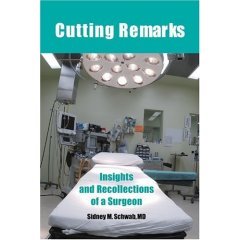Sunday, April 16, 2006

Don't Steal this Book...
Buy it. If you are a surgeon, planning to become one, or are just close to one I highly recommend the surgical memoir of Dr. Sidney Schwab: Cutting Remarks : Insights and Recollections of a Surgeon Dr. Schwab describes his experiences as a surgical trainee at the University of California San Francisco in the early 1970's, as well as his tour of duty in Vietnam. I read this book over a day and a half, I just couldn't put it down. Dr. Schwab tells of training under such surgical greats such as Dr. William Blaisdell, Dr. Ted Schrock and Dr. Donald Trunkey. He brings home the lesson that all residents learn, that residency serves not only to teach you how to do things, but also how not to do things. While names are changed to "protect the innocent" Dr. Schwab pulls no punches in his criticisms of attendings that were incompetent or dangerous: "cursed to live in surgeons bodies, but unable to find the control panel". While this takes place at the same time as The House of God it does differ in many ways. While the House of God takes a dark view of residency training, wondering if the year was worth it, Dr. Schwab describes a grueling training experience but in the end he finds it all worthwhile. Also, not everyone is having sex with each other all the time (that is thankfully reserved for Gray's Anatomy). Surgical decision-making is succinctly examined:
Surgeons may have brass balls but not crystal ones.Dr. Schwab provides an excellent description of the difference between a "great" surgeon and a "good" surgeon:
Being a great surgeon is not about having fast hands or making flashy moves. It's about knowing exactly what you want to accomplish And doing it without wasted motion. Knowing the right thing to do and doing it right the first time (rarely can a second attempt be executed without exacting a toll on the patient). Anticipating, adjusting. Understanding and being able to find the precise layers and planes between tissues and working within them. Many surgeons don't. I had a teacher in high school, the baseball coach, who liked to say that the best outfielder was the one making the easy catch. He knows the game situation, watches the catcher set up, sees the signs, figures where he needs to be. You can't avoid all circus catches, but they ought to be rare. Surgery is the same. You admire the surgeon who stops the bleeding, gets out of the tight spot, stays at the bedside in the ICU. I do, too. More, I admire the one who knows how to avoid all that stuff in the first place. A great surgeon makes it look easy. But because the body is resilient, because it will heal itself given half a chance, it mostly doesn't matter. Good enough is good enough, great is largely wasted. When the bandage goes on you likely won't be able to tell if your hernia was repaired or your colon resected in a beautiful way, displaying anatomy cleanly and apposing tissues artfully or just adequately. You'll be fine either way. But take several hundred patients, or a few very sick ones with no physiologic reserve, and over time you'll see a divergence.I could not agree more. Go read it, and enjoy. |






